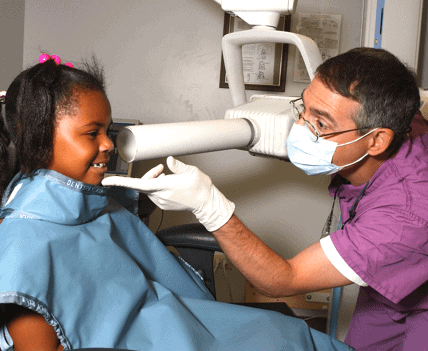See These 8 Tips to Help a Child with Dental Anxiety

What is the impact of dental anxiety on children?
It is important to take children for annual dental visits to keep their teeth healthy and encourage positive oral hygiene habits from a young age.
However, dental anxiety in children is a major public health concern. Severe anxiety can lead to cardiac sensations, trembling, sweating, and/or paresthesia (pins and needles).
Dental anxiety or “dental phobia” is a common occurrence and can lead to poor oral health if the severity of the anxiety or dental fears prevents a child from partial or full participation in dental care.
8 Tips to Help a Child with Dental Anxiety
1. Start dental habits as early as possible.
The earlier your child understands the importance of good oral health and becomes acquainted with their dentist’s office, the better. If your child is older, it is never too late to start.

As the parent, talk about the importance of teeth brushing, dental cleanings, etc., and the difference in our mouths when we have good vs. bad oral hygiene.
Model good oral hygiene habits through your own actions.
At the dentist, your child will learn more about oral hygiene and dental procedures. They will also begin to get familiar with the dental environment.
Check with a local pediatric or family dentist to determine if your child needs a visit to the dentist. Once your child has their first visit, keep appointments scheduled periodically as recommended by their dental office.
2. Prepare your child for what going to the dentist is like.
They may be a bit more relaxed if they understand what will happen or what is happening.
The dentist can explain the procedure to both you and your child together so that your child knows exactly what is happening.
This is known as the “tell-show-do” method and gives your child a sense of both control and predictability.
Research also shows that exposing children to an informative presentation about dental care reduces anxiety about dental visits.
You may also like I Am Going to the Dentist: A Social Story to Prepare Children for Dental Visits
3. Use Relaxation Techniques
According to research, simple deep breathing exercises, such as deep inhalation and slow exhalation (while focusing on how the breathing feels) or asking a child to blow bubbles through a wand, can help bring relief.
Muscle relaxation techniques can also help as this loosens up your child’s body. What this means is that the child would systematically tense up, and then relax, different muscles of the body either before or while lying in the dentist’s chair (see three videos below to assist with relaxation).
4. Watch how you portray the dentist around your child.
If you struggle with your own dental anxiety, phobia, or something similar, show your child how you are working through it.
Avoid using any negative words around your child when talking about the dentist or any dental procedures that they may be undergoing.

Let the dental staff introduce your child to dental vocabulary (e.g., drill, filling, scraper) to avoid confusion or preconceived fears about these terms.
5. Consider a pretend dentist office visit.
Complete a “pretend visit” a few times with your children prior to the actual visit. Keep your child engaged by letting them role-play patient, dentist, etc. They can even practice with a play dentist kit.
6. Reinforce the positive.
Reward your child for positive behavior at the dentist with something you know they like (e.g., preferred item or favorite activity such as sticker, sidewalk chalk, video game, etc.).

Something small can be rewarded, even if your child did not get through every step.
7. Use systematic desensitization if time allows.
Systematic desensitization involves introducing your child to dentistry gradually over a period of time. This can be achieved by scheduling appointments with your dentist prior to any actual treatment.
If your child has anxiety, a caring dental office will work with you, taking the steps necessary to help your child feel comfortable.
8. Look for a caring and supportive dentist.
A dentist who wants to help ease your child’s anxiety should:
- Speak to them in a friendly/calm/understanding voice with easy-to-understand words
- Use encouraging words, stories, etc. to engage your child
- Acknowledge positive behavior exhibited by your child at the dentist
- Develop a plan with you to help work through your child’s dental anxiety if needed – some dentists will give sedative medications
A child-friendly dentist can also give demonstrations of dental procedures on a doll to help put your child at ease before their own exam, cleaning, etc.

If your child’s anxiety feels overwhelming or unmanageable, or if it interferes with life functioning, please consult with your child’s medical and/or mental health providers for additional support.
You May Also Like: 9 Tips to Calm General Anxiety in Children
Education and Behavior – Keeping adults on the same page for kids!

Rachel Wise is the author and founder of Education and Behavior. Rachel created Education and Behavior in 2014 for adults to have an easy way to access research-based information to support children in the areas of learning, behavior, and social-emotional development. As a survivor of abuse, neglect, and bullying, Rachel slipped through the cracks of her school and community. Education and Behavior hopes to play a role in preventing that from happening to other children. Rachel is also the author of Building Confidence and Improving Behavior in Children: A Guide for Parents and Teachers.
“Children do best when there is consistency within and across settings (i.e., home, school, community). Education and Behavior allows us to maintain that consistency.”









